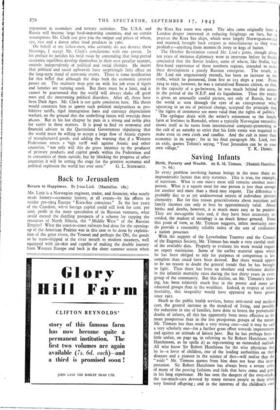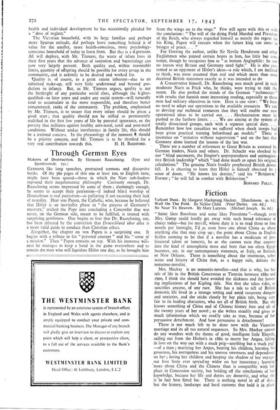Saving Infants
Birth, Poverty and 'Wealth. fly R. M.-Timms. (Hanish Hamilton. 7s. 6d.)
IN every problem involving human beings in the mass there arr.: imponderable factors that defy statistics. This is true, for example, of nutrition. What is one man's meat still remains another ,man's poison. What is a square meal for one person is less' than enough for another and more than a third may require. The difference is probably due to as yet undiscovered secrets of individual internal chemistry. But for this reason generalisations about nutrition and family incomes can only at best be approximately valid. About births and deaths, however, it is much more easy to be positive. _They are inescapable facts and, if they have been accurately re- corded, the student of sociology is on much firmer ground. From this point of view, as Mr. Titmuss suggests, infant mortality rates do provide a reasonably reliable index of the sort of civilisation a nation possesses.
With the support of the Leverhulme Trustees and the Council of the Eugenics Society, Mr. Titmuss has made a very careful study of the available data. Properly to evaluate his work would require an expert statistician. Some of the earlier material upon which he has been obliged to rely for purposes of comparison is less complete than could have been desired. But there would appear to be no reason to doubt the general trends that he has brought to light. Thus there has been an absolute and welcome decline in the infantile mortality rates during the last thirty years in every group of the community. But this decline, on Mr. Titmuss's show- ing, has been relatively much less in the poorer and more un- educated groups than in' the wealthier. Indeed, in respect of infant mortality, this inequality' would have appeared to have grown since 1911.
Much as the public health services, better ante-natal and medical care, the general increase in the standard of living, and possibly the reduction in size of families, have done to lessen the preventable deaths of infants, all this has apparently been more effective in tF: more prosperous than in the less prosperous groups of the nation. Mr. Titmuss has thus made a very strong case—and it may be said a very scholarly .one—for a further great effort towards improvement and against an attitude of laissez faire. But he has perhaps been a little unfair, on page 94, in referring to Sir Robert Hutchison (not Hutchinson, as he spells it) as representing an outmoded outlook. All who know Sir Robert Hutchison for the wise physician that he is—a lover of children, one of the leading authorities on their diseases and a pioneer in the science of diet—will realise that the " aside " Mr. Titmuss quotes from him does not bear this inter- pretation. Sir Robert Hutchison has always been a severe critic of many of the passing fashions and fads that have come and gon: in his long experience. He has seen the dangers of the over-study. the too-much-care devoted by many earnest people to their often very limited offspring ; and in the interests of the children's own
health and individual development he has occasionally pleaded for a " dose of neglect."
The Victorian household, with its large families and perhaps more Spartan attitude, did perhaps leave something behind it of value for the smaller, more health-conscious, more psychology- conscious household of today to learn from. But this is a digression. All will deplore, with Mr. Titmuss, the waste of infant lives in their first years that the advance of sanitation and bacteriology can now very largely prevent. Both quality and, within reasonable limits, quantity of offspring should be possible for every group in the community, and is ardently to be desired and worked for.
'Quality is, of course, to a great extent inherent—due to an inherited make-up, still very little understood and beyond pre- diction in infancy. But, as Mr. Titmuss argues, quality is not the birthright of any particular social class, although the higher- qualified—in later years and under any social syste_in—will naturally tend to accumulate in the more responsible, and therefore better remunerated, ranks of the community. The problem, emphasised by Mr. Titmuss, is to secure that every infant should be given a good start ; that quality should not be stifled or permanently stultified in the first few years of life by parental ignorance, or the poverty that militates against healthy ante-natal, natal and post-natal conditions. Without undue interference in family life, this should be a national content. In the phraseology of the moment It should be a priority concern, and Mr. Titmuss is to be thanked for a very real contribution towards this. H. H. BASHFORD.



























 Previous page
Previous page